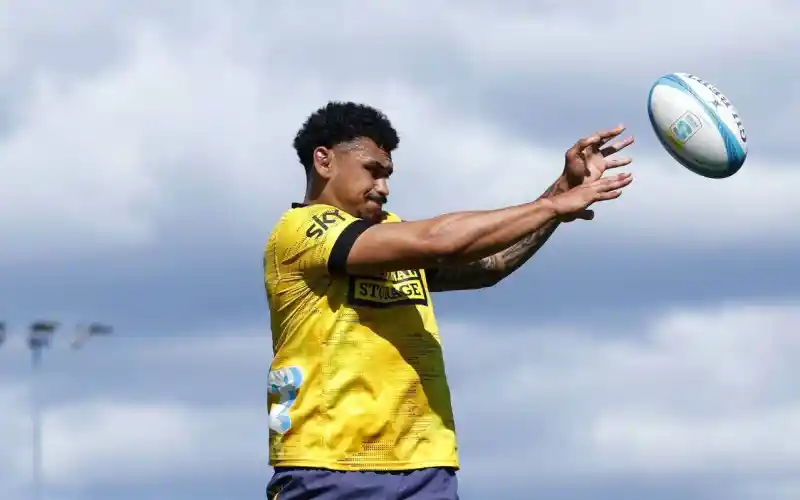Business
New Zealand-Based Rugby Athlete Receives Suspension Following Positive THC Test

Isaia Walker-Leawere will be suspended for one month, along with a voluntary treatment program.
New Zealand rugby player, Isaia Walker-Leawere, recently tested positive for THC and has been banned from playing on any team for one month. The 26-year-old lock (a second row rugby position) plays on the Hurricanes in Super Rugby; Hawke’s Bay; as well as the international rugby team, Māori All Blacks. According to the New Zealand Herald, he’s played in over 120 first-class matches over the past eight years.
Walker-Leawere tested positive following a match in Fiji on May 6, where he received two yellow cards and a red card. Due to the red card, Walker-Leawere went through the Sanzaar Super Rugby Pacific Judicial Process and the incident was reviewed by the Sanzaar Foul Play Review Committee on May 8. The verdict was that Walker-Leawere wouldn’t be suspended or punished.
However, on May 10 he spent time with friends to “wind down” from the week’s events, which is when he consumed cannabis. His suspension for testing positive went into effect starting on August 5.
“We don’t believe that cannabis is performance-enhancing,” said Drug Free Sport New Zealand Chief Executive Nick Paterson. “Getting Mr. Walker-Leawere substance of abuse support and back into sport after serving his sanction is the most practical outcome, and supports long-term athlete health and wellbeing.”
However, Paterson added that attempts are being made to remove cannabis from the list of illegal substances. “We’ve advocated to remove cannabis from the prohibited list for over 15 years and will continue to do so,” Paterson continued. “However, while cannabis remains on the prohibited list, the best approach to avoiding a positive test is to avoid using it.”
The Drug Free Spot New Zealand follows guidelines from the World Anti-Doping Agency (WADA) in terms of prohibited substances. According to WADA’s 2023 Prohibited List, cannabis is banned in all forms. “All natural and synthetic cannabinoids are prohibited except for cannabidiol (CBD). Cannabis, hashish and marijuana are prohibited. Products, including foods and drinks, containing cannabinoids, are also prohibited. All synthetic cannabinoids that mimic the effects of THC are prohibited,” WADA stated on its website.
Drug Free Sport New Zealand allows athletes to undergo a treatment program to reduce their ban duration. For Walker-Leawere, he would be banned for three months instead of one month if he decided not to participate in the program.
Like other athletes in the U.S., some rugby players have come forth about the benefits of cannabis consumption. Welsh rugby player Dominic Day and English rugby player George Kruis also spoke up in support of CBD in the past, which led to the founding of their athletic-focused brand, fourfiveCBD in 2019.
FourfiveCBD targets health and wellness for quality of life improvements. “At fourfive, our mission is simple—we want to help people lead healthier, happier lives through the power of CBD and Vitamin supplements—and we only use the highest quality plant extracts and ingredients. Our premium blends are designed by world class scientists to fit seamlessly into your daily routine, whether you’re taking CBD oil, capsules or vitamins,” the brand wrote on its website.
According to a BBC interview, Day started using CBD when recovering from knee surgery, which helped reduce inflammation and improve his sleep as well. “The first thing I noticed was my sleep was amazing. The inflammation in my knee also went down and it relieved the pain. I was sold from then on,” Day said.
Kruis also added the benefits of sleep, as well as reducing his use of opioids. “Sleep was definitely one of the things it helped with for me,” Kruis said. “But I also have low-level chronic pain and I was able to reduce the amount of painkillers I was taking.”
Business
New Mexico cannabis operator fined, loses license for alleged BioTrack fraud

New Mexico regulators fined a cannabis operator nearly $300,000 and revoked its license after the company allegedly created fake reports in the state’s traceability software.
The New Mexico Cannabis Control Division (CCD) accused marijuana manufacturer and retailer Golden Roots of 11 violations, according to Albuquerque Business First.
Golden Roots operates the The Cannabis Revolution Dispensary.
The majority of the violations are related to the Albuquerque company’s improper use of BioTrack, which has been New Mexico’s track-and-trace vendor since 2015.
The CCD alleges Golden Roots reported marijuana production only two months after it had received its vertically integrated license, according to Albuquerque Business First.
Because cannabis takes longer than two months to be cultivated, the CCD was suspicious of the report.
After inspecting the company’s premises, the CCD alleged Golden Roots reported cultivation, transportation and sales in BioTrack but wasn’t able to provide officers who inspected the site evidence that the operator was cultivating cannabis.
In April, the CCD revoked Golden Roots’ license and issued a $10,000 fine, according to the news outlet.
The company requested a hearing, which the regulator scheduled for Sept. 1.
At the hearing, the CCD testified that the company’s dried-cannabis weights in BioTrack were suspicious because they didn’t seem to accurately reflect how much weight marijuana loses as it dries.
Company employees also poorly accounted for why they were making adjustments in the system of up to 24 pounds of cannabis, making comments such as “bad” or “mistake” in the software, Albuquerque Business First reported.
Golden Roots was fined $298,972.05 – the amount regulators allege the company made selling products that weren’t properly accounted for in BioTrack.
The CCD has been cracking down on cannabis operators accused of selling products procured from out-of-state or not grown legally:
- Regulators alleged in August that Albuquerque dispensary Sawmill Sweet Leaf sold out-of-state products and didn’t have a license for extraction.
- Paradise Exotics Distro lost its license in July after regulators alleged the company sold products made in California.
Golden Roots was the first alleged rulebreaker in New Mexico to be asked to pay a large fine.
Source: https://mjbizdaily.com/new-mexico-cannabis-operator-fined-loses-license-for-alleged-biotrack-fraud/
Business
Marijuana companies suing US attorney general in federal prohibition challenge

Four marijuana companies, including a multistate operator, have filed a lawsuit against U.S. Attorney General Merrick Garland in which they allege the federal MJ prohibition under the Controlled Substances Act is no longer constitutional.
According to the complaint, filed Thursday in U.S. District Court in Massachusetts, retailer Canna Provisions, Treevit delivery service CEO Gyasi Sellers, cultivator Wiseacre Farm and MSO Verano Holdings Corp. are all harmed by “the federal government’s unconstitutional ban on cultivating, manufacturing, distributing, or possessing intrastate marijuana.”
Verano is headquartered in Chicago but has operations in Massachusetts; the other three operators are based in Massachusetts.
The lawsuit seeks a ruling that the “Controlled Substances Act is unconstitutional as applied to the intrastate cultivation, manufacture, possession, and distribution of marijuana pursuant to state law.”
The companies want the case to go before the U.S. Supreme Court.
They hired prominent law firm Boies Schiller Flexner to represent them.
The New York-based firm’s principal is David Boies, whose former clients include Microsoft, former presidential candidate Al Gore and Elizabeth Holmes’ disgraced startup Theranos.
Similar challenges to the federal Controlled Substances Act (CSA) have failed.
One such challenge led to a landmark Supreme Court decision in 2005.
In Gonzalez vs. Raich, the highest court in the United States ruled in a 6-3 decision that the commerce clause of the U.S. Constitution gave Congress the power to outlaw marijuana federally, even though state laws allow the cultivation and sale of cannabis.
In the 18 years since that ruling, 23 states and the District of Columbia have legalized adult-use marijuana and the federal government has allowed a multibillion-dollar cannabis industry to thrive.
Since both Congress and the U.S. Department of Justice, currently headed by Garland, have declined to intervene in state-licensed marijuana markets, the key facts that led to the Supreme Court’s 2005 ruling “no longer apply,” Boies said in a statement Thursday.
“The Supreme Court has since made clear that the federal government lacks the authority to regulate purely intrastate commerce,” Boies said.
“Moreover, the facts on which those precedents are based are no longer true.”
Verano President Darren Weiss said in a statement the company is “prepared to bring this case all the way to the Supreme Court in order to align federal law with how Congress has acted for years.”
While the Biden administration’s push to reschedule marijuana would help solve marijuana operators’ federal tax woes, neither rescheduling nor modest Congressional reforms such as the SAFER Banking Act “solve the fundamental issue,” Weiss added.
“The application of the CSA to lawful state-run cannabis business is an unconstitutional overreach on state sovereignty that has led to decades of harm, failed businesses, lost jobs, and unsafe working conditions.”
Business
Alabama to make another attempt Dec. 1 to award medical cannabis licenses

Alabama regulators are targeting Dec. 1 to award the first batch of medical cannabis business licenses after the agency’s first two attempts were scrapped because of scoring errors and litigation.
The first licenses will be awarded to individual cultivators, delivery providers, processors, dispensaries and state testing labs, according to the Alabama Medical Cannabis Commission (AMCC).
Then, on Dec. 12, the AMCC will award licenses for vertically integrated operations, a designation set primarily for multistate operators.
Licenses are expected to be handed out 28 days after they have been awarded, so MMJ production could begin in early January, according to the Alabama Daily News.
That means MMJ products could be available for patients around early March, an AMCC spokesperson told the media outlet.
Regulators initially awarded 21 business licenses in June, only to void them after applicants alleged inconsistencies with how the applications were scored.
Then, in August, the state awarded 24 different licenses – 19 went to June recipients – only to reverse themselves again and scratch those licenses after spurned applicants filed lawsuits.
A state judge dismissed a lawsuit filed by Chicago-based MSO Verano Holdings Corp., but another lawsuit is pending.
Source: https://mjbizdaily.com/alabama-plans-to-award-medical-cannabis-licenses-dec-1/
-

 Business2 years ago
Business2 years agoPot Odor Does Not Justify Probable Cause for Vehicle Searches, Minnesota Court Affirms
-

 Business2 years ago
Business2 years agoNew Mexico cannabis operator fined, loses license for alleged BioTrack fraud
-

 Business2 years ago
Business2 years agoAlabama to make another attempt Dec. 1 to award medical cannabis licenses
-

 Business2 years ago
Business2 years agoWashington State Pays Out $9.4 Million in Refunds Relating to Drug Convictions
-

 Business2 years ago
Business2 years agoMarijuana companies suing US attorney general in federal prohibition challenge
-

 Business2 years ago
Business2 years agoLegal Marijuana Handed A Nothing Burger From NY State
-

 Business2 years ago
Business2 years agoCan Cannabis Help Seasonal Depression
-

 Blogs2 years ago
Blogs2 years agoCannabis Art Is Flourishing On Etsy













